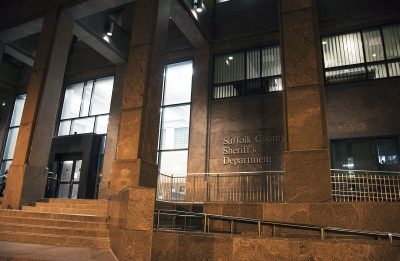
Boston Mayor Martin Walsh partnered with Suffolk County Sheriff Steven Tompkins to provide an expansion of recovery services for Suffolk County inmates during incarceration and after release, according to a Wednesday press release.
The Recovery Partnership between the Mayor’s Office of Recovery Services and the Suffolk County Sheriff’s Department will implement a series of regular recovery panels at the Suffolk County House of Corrections and Suffolk County Jail to aid inmates in the release process, Tompkins wrote in an email to The Daily Free Press.
“Service providers, experts and relevant stakeholders will offer guidance and connections to inmates prior to their release, helping to guide the inmates through the early recovery process, and allowing them to build a network of support in the neighborhoods where they live,” he wrote.
Tompkins said the Sheriff’s Department plans to start panels at Suffolk County Jail and the Suffolk Country House of Correction in mid-March.
“We strive to help those in our custody to rehabilitate through our recovery, educational and vocational programs so that they might leave us in better stead than when they arrived, armed with the ability to overcome some of the barriers that prevented them from leading positive, productive and healthier lives,” he wrote.
Approximately 85 percent of the population at Suffolk County Jail and the House of Correction are incarcerated due to crimes committed in relation to substance and/or alcohol abuse, according to Tompkins.
“Our staff here at the Department will continue to meet with members of the Mayor’s Office of Recovery Services to share information, implement best practices and work together to deliver services that will help our inmates and detainees to transition … into programming and services in the community that will give them the best chances at successful reentry,” he said.
Marjorie Nesin, director of communications for the Boston Public Health Commission, wrote in an email that the recovery panels will include staff from AHOPE, a needle exchange program, and Providing Access to Addictions Treatment, Hope and Support, an addiction treatment program.
“Their contributions will include overdose prevention and Narcan training, building connections with the people who are incarcerated and helping those people connect with the appropriate treatment in the neighborhood where they’ll live upon release,” she wrote.
Nesin said inmates are at an increased risk of overdose when they are released from jail, and therefore it is necessary to provide these recovery-focused services.
“Often the potency of street drugs has changed during their incarceration and their tolerance to those drugs has decreased,” she wrote. “Inmates in recovery often face a unique set of challenges as they work to reenter society while working on their recovery.”
Matthew Hoffman, the executive director of Boston Alcohol and Substance Abuse Programs, said the first 48 hours after release from prison or jail are the most critical for those who struggle with addiction.
“Timing is critical,” he said. “Once [the released inmates] drift out of the 48-hour re-entry phase, the risk of relapse skyrockets.”
Several Boston residents responded positively to the partnership.
Ginny Hollingsworth, 23, of the South End, said the partnership could be a step toward establishing the systemic change needed in Massachusetts.
“While many may think of being in prison as hitting ‘rock bottom,’ [by] providing recovery services to incarcerated addicts, we can hopefully create opportunities for these individuals to break free from their addiction-ridden pasts and be more likely to have a positive and healthy future,” she said.
Tasha Kaufman, 23, of Brighton, said the partnership is a logical action for the city to prevent those who have struggled with substance abuse from relapsing after being released.
“From a medical standpoint, addicts often need a significant amount of support, especially if they’re suddenly cut off,” she said. “I assume that recovery services have been proven to decrease the chance of becoming addicted again after they are released from jail, which would put them in a better position to succeed in life after their incarceration.”




